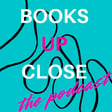
Ep. 6. Lola Olufemi, Experiments in Imagining Otherwise
In this episode, we read the opening of Lola Olufemi's Experiments in Imagining Otherwise (2021). Buy the novel from a local independent bookshop, Bookshop.org, or directly from Hajar Press.
Dr. Lola Olufemi is a black feminist writer and Stuart Hall foundation researcher who completed her doctorate based in the Centre for Research and Education in Art and Media at the University of Westminster. Her work focuses on the utility of the political imagination in the textual and visual cultures of radical social movements, examining the role cultural production plays in processes of materialist resistance and collective conceptualisations of futurity. She is author of Feminism Interrupted: Disrupting Power (2020), Experiments in Imagining Otherwise (2021), the forthcoming Against Literature (2026) and a member of 'bare minimum', an interdisciplinary anti-work arts collective.
Find the transcript and more about the show on Substack. Follow the show on Instagram.
Please leave feedback here.
Produced, hosted, and edited by Chris Lloyd.
